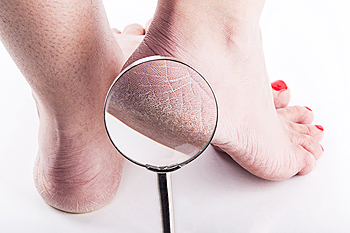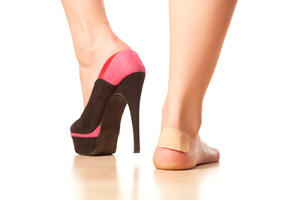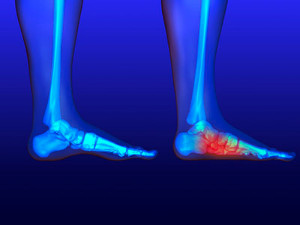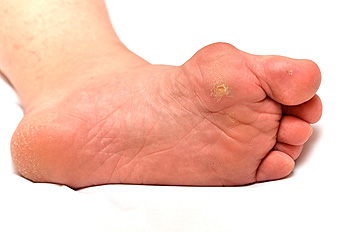Items filtered by date: June 2019
Cracked Heels Can Cause Difficulty in Walking
 The uncomfortable condition that is known as cracked heels can develop for a variety of reasons. If the climate is cold and dry, the risk of having this ailment may increase. Additionally, the skin on the heels can become dry if medical conditions exist that include eczema and psoriasis. Another common cause of this condition is wearing shoes that have an open back. Mild relief may be found by washing the feet in warm water, followed by using a good moisturizer. If you have children, it is important to notice if they have cracked heels, and are having difficulty walking. If this pertains to you or your child, it is advised to consult with a podiatrist as quickly as possible so the correct treatment can begin.
The uncomfortable condition that is known as cracked heels can develop for a variety of reasons. If the climate is cold and dry, the risk of having this ailment may increase. Additionally, the skin on the heels can become dry if medical conditions exist that include eczema and psoriasis. Another common cause of this condition is wearing shoes that have an open back. Mild relief may be found by washing the feet in warm water, followed by using a good moisturizer. If you have children, it is important to notice if they have cracked heels, and are having difficulty walking. If this pertains to you or your child, it is advised to consult with a podiatrist as quickly as possible so the correct treatment can begin.
Cracked heels are unsightly and can cause further damage to your shoes and feet. If you have any concerns, contact our podiatrists from CNY Foot Surgery & Podiatry Care. Our doctors can provide the care you need to keep you pain-free and on your feet.
Cracked Heels
Cracked heels appear unappealing and can make it harder for you walk around in sandals. Aside from looking unpleasant, cracked heels can also tear stockings, socks, and wear out your shoes. There are several methods to help restore a cracked heel and prevent further damage.
How Do You Get Them?
Dry skin is the number one culprit in creating cracked heels. Many athletes, walkers, joggers, and even swimmers suffer from cracked heels. Age and skin oil production play a role to getting cracked heels as well.
Promote Healing
Over the counter medicines can help, especially for those that need instant relief or who suffer from chronic dry feet.
Wear Socks – Wearing socks with medicated creams helps lock in moisture.
Moisturizers – Applying both day and night will help alleviate dryness which causes cracking.
Pumice Stones – These exfoliate and remove dead skin, which allows for smoother moisturizer application and better absorption into the skin.
Change in Diet
Eating healthy with a well-balanced diet will give the skin a fresh and radiant look. Your body responds to the kinds of food you ingest. Omega-3 fatty acids and zinc supplements can also revitalize skin tissue.
Most importantly, seek professional help if unsure how to proceed in treating cracked heels. A podiatrist will help you with any questions or information needed.
If you have any questions, please feel free to contact our office located in East Syracuse, NY . We offer the newest diagnostic and treatment technologies for all your foot care needs.
Wearing High Heels Can Cause Possible Foot Damage
 Many women enjoy wearing high heels despite knowing they can be harmful to the feet. There are many uncomfortable conditions that can originate from wearing this type of shoe, including shortened Achilles tendons, and a restriction in circulation. Additionally, the ankles can bend forward, and it may feel like you are standing on tiptoes when high heels are worn. Many people experience bunions and hammertoes from wearing high heels. These ailments can be a result of having inadequate room for the toes to move freely in. Research has shown it is beneficial to alternate between wearing high heels and flat shoes, as this may help to reduce any foot damage that can occur. If you would like additional information about how high heels can harm the feet, please consult with a podiatrist.
Many women enjoy wearing high heels despite knowing they can be harmful to the feet. There are many uncomfortable conditions that can originate from wearing this type of shoe, including shortened Achilles tendons, and a restriction in circulation. Additionally, the ankles can bend forward, and it may feel like you are standing on tiptoes when high heels are worn. Many people experience bunions and hammertoes from wearing high heels. These ailments can be a result of having inadequate room for the toes to move freely in. Research has shown it is beneficial to alternate between wearing high heels and flat shoes, as this may help to reduce any foot damage that can occur. If you would like additional information about how high heels can harm the feet, please consult with a podiatrist.
High heels have a history of causing foot and ankle problems. If you have any concerns about your feet or ankles, contact our podiatrists from CNY Foot Surgery & Podiatry Care. Our doctors can provide the care you need to keep you pain-free and on your feet.
Effects of High Heels on the Feet
High heels are popular shoes among women because of their many styles and societal appeal. Despite this, high heels can still cause many health problems if worn too frequently.
Which Parts of My Body Will Be Affected by High Heels?
- Ankle Joints
- Achilles Tendon – May shorten and stiffen with prolonged wear
- Balls of the Feet
- Knees – Heels cause the knees to bend constantly, creating stress on them
- Back – They decrease the spine’s ability to absorb shock, which may lead to back pain. The vertebrae of the lower back may compress.
What Kinds of Foot Problems Can Develop from Wearing High Heels?
- Corns
- Calluses
- Hammertoe
- Bunions
- Morton’s Neuroma
- Plantar Fasciitis
How Can I Still Wear High Heels and Maintain Foot Health?
If you want to wear high heeled shoes, make sure that you are not wearing them every day, as this will help prevent long term physical problems. Try wearing thicker heels as opposed to stilettos to distribute weight more evenly across the feet. Always make sure you are wearing the proper shoes for the right occasion, such as sneakers for exercising. If you walk to work, try carrying your heels with you and changing into them once you arrive at work. Adding inserts to your heels can help cushion your feet and absorb shock. Full foot inserts or metatarsal pads are available.
If you have any questions please feel free to contact our office located in East Syracuse, NY . We offer the newest diagnostic and treatment technologies for all your foot and ankle needs.
Tips for People with Flat Feet
 Having flat feet can cause pain, difficulty with exercising, and hardships for finding shoes. However, you are not necessarily stuck with the issues flat feet generate. There are a few things to do to help with this condition. Primarily, you can stretch the calf muscle, as to avoid further arch collapse. Next, you can perform exercises that strengthen the intrinsic foot muscles near the arch. While wearing shoes, you can wear inserts that align the bones of the foot properly. Conversely, going barefoot when possible could help strengthen the foot. In cases where a flat foot imposes an extreme burden on the person’s life, surgery may be an option. Surgery would be the only comprehensive cure for a flat foot. All of the other options alleviate pain and improve alignment. If you have flat feet, consult with a podiatrist to find out which treatment alternatives could work for you.
Having flat feet can cause pain, difficulty with exercising, and hardships for finding shoes. However, you are not necessarily stuck with the issues flat feet generate. There are a few things to do to help with this condition. Primarily, you can stretch the calf muscle, as to avoid further arch collapse. Next, you can perform exercises that strengthen the intrinsic foot muscles near the arch. While wearing shoes, you can wear inserts that align the bones of the foot properly. Conversely, going barefoot when possible could help strengthen the foot. In cases where a flat foot imposes an extreme burden on the person’s life, surgery may be an option. Surgery would be the only comprehensive cure for a flat foot. All of the other options alleviate pain and improve alignment. If you have flat feet, consult with a podiatrist to find out which treatment alternatives could work for you.
Flatfoot is a condition many people suffer from. If you have flat feet, contact our podiatrists from CNY Foot Surgery & Podiatry Care. Our doctors will treat your foot and ankle needs.
What Are Flat Feet?
Flatfoot is a condition in which the arch of the foot is depressed and the sole of the foot is almost completely in contact with the ground. About 20-30% of the population generally has flat feet because their arches never formed during growth.
Conditions & Problems:
Having flat feet makes it difficult to run or walk because of the stress placed on the ankles.
Alignment – The general alignment of your legs can be disrupted, because the ankles move inward which can cause major discomfort.
Knees – If you have complications with your knees, flat feet can be a contributor to arthritis in that area.
Symptoms
- Pain around the heel or arch area
- Trouble standing on the tip toe
- Swelling around the inside of the ankle
- Flat look to one or both feet
- Having your shoes feel uneven when worn
Treatment
If you are experiencing pain and stress on the foot you may weaken the posterior tibial tendon, which runs around the inside of the ankle.
If you have any questions please feel free to contact our office located in East Syracuse, NY . We offer the newest diagnostic and treatment technologies for all your foot and ankle needs.
Are Bunions Affecting Your Everyday Life?
Causes and Symptoms of Bunions
 A large bump at the base of the big toe may be referred to as a bunion. It may cause the big toe to turn toward the second toe. The symptoms that are most often associated with bunions include pain, tenderness, or swelling surrounding the affected area. Bunions can develop for a variety of reasons. These include shoes that do not have adequate room for the toes to move freely in, genetic factors, or an injury that has occurred. If you are afflicted with this ailment, mild relief may be found by wearing shoes that fit properly or putting a protective covering over the bunion. If you have a bunion that is affecting your daily activities, it is advised to counsel with a podiatrist who can offer a treatment solution.
A large bump at the base of the big toe may be referred to as a bunion. It may cause the big toe to turn toward the second toe. The symptoms that are most often associated with bunions include pain, tenderness, or swelling surrounding the affected area. Bunions can develop for a variety of reasons. These include shoes that do not have adequate room for the toes to move freely in, genetic factors, or an injury that has occurred. If you are afflicted with this ailment, mild relief may be found by wearing shoes that fit properly or putting a protective covering over the bunion. If you have a bunion that is affecting your daily activities, it is advised to counsel with a podiatrist who can offer a treatment solution.
If you are suffering from bunion pain, contact our podiatrists of CNY Foot Surgery & Podiatry Care. Our doctors can provide the care you need to keep you pain-free and on your feet.
What Is a Bunion?
Bunions are painful bony bumps that usually develop on the inside of the foot at the joint of the big toe. As the deformity increases over time, it may become painful to walk and wear shoes. Women are more likely to exacerbate existing bunions since they often wear tight, narrow shoes that shift their toes together. Bunion pain can be relieved by wearing wider shoes with enough room for the toes.
Causes
- Genetics – some people inherit feet that are more prone to bunion development
- Inflammatory Conditions - rheumatoid arthritis and polio may cause bunion development
Symptoms
- Redness and inflammation
- Pain and tenderness
- Callus or corns on the bump
- Restricted motion in the big toe
In order to diagnose your bunion, your podiatrist may ask about your medical history, symptoms, and general health. Your doctor might also order an x-ray to take a closer look at your feet. Nonsurgical treatment options include orthotics, padding, icing, changes in footwear, and medication. If nonsurgical treatments don’t alleviate your bunion pain, surgery may be necessary.
If you have any questions, please feel free to contact our office located in East Syracuse, NY . We offer the newest diagnostic and treatment technologies for all your foot care needs.




